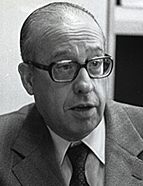

Vitorino Magalhães Godinho wanted to undertake a major work to understand and explain Portugal, a pivotal work to understand ourselves as being Portuguese. Obviously, as in all major tasks where comprehensiveness is the goal, this work was doomed to incompletion. Even so, these writings and publications are immense and force us to move towards the unveiling of the complexity of a past that must, with its successes and failures, be researched. Therefore, there are many titles to which he contributed with this construction of our duty while seeking to reflect on the present reality, on a national reality which he could neither forget nor suspend. He alerted to a crisis he had rapidly detected, stemming from a course of the economy which denied the contribution of other human sciences, confining itself to a shallow “economic theory”. New contributions emerged, paying special attention to the construction of Europe, with a natural democratic mistrust of what was being discussed in the private assemblies that excluded citizens. He thought that the constitution of Europe had to be discussed and approved by the whole community, not only by a few leaders. He thought that it was necessary to Mudar de rumo [Change Course]. Without separating Portugal’s problems from the problems of Europe, such is the title of one of his last books of civic intervention.
In 2004, he published an extensive essay, grounded on vast erudition and a historical re-interpretation, the seminal work Portugal a emergência de uma Nação [Portugal and the Emergence of a Nation]. A community of land and people, how did Portugal form and construct itself? What combination of elements – often conflicting elements – resulted in this nation, one of the first in Europe to present itself as such? What politics, economies, social clashes and ways of life, collective existences and individual wills came together to form this Kingdom in a Hispanic Peninsula that appeared to be a space for one State alone? Portugal State-Kingdom (Nation), the finishing line of a complex history, whose establishment was acknowledged in 1479-1480 with the Treaty of Alcáçovas-Toledo, signed by the Portuguese monarchs and the monarchs of Castile and Aragon. This Treaty put an end to the closely preceding and long-standing royal and aristocratic conflicts, the course of which must be followed to fully understand how national identity and cohesion are enrooted therein. Magalhães Godinho used a concept he himself had coined, namely the historical-geographical complex. A Peninsular framework in which it is incorporated. Particular relevance was given to military conflicts and maps, which Godinho had been vindicating since the end of the 1940s, when he had claimed to lecture all his classes with a map before him.
“The Peninsula is divided between a Kingdom which is a maritime State-Nation, the only peripheral state with this status, and a complex with a dynastic unity of kingdoms and seigneurs, in the periphery, nationalities submitted to a centre which is fully a State in itself.”
